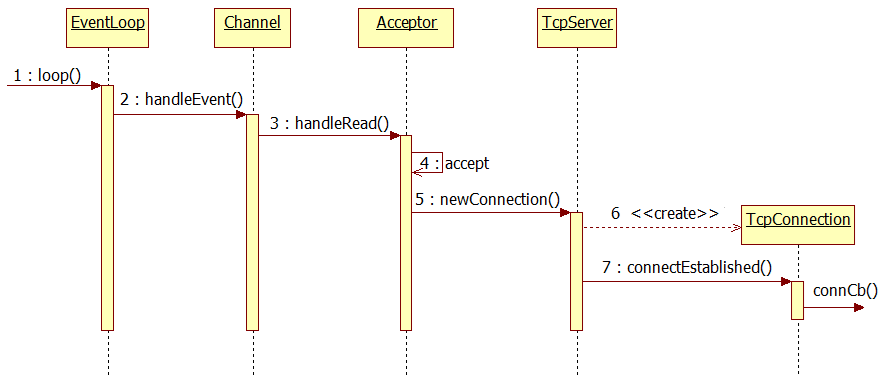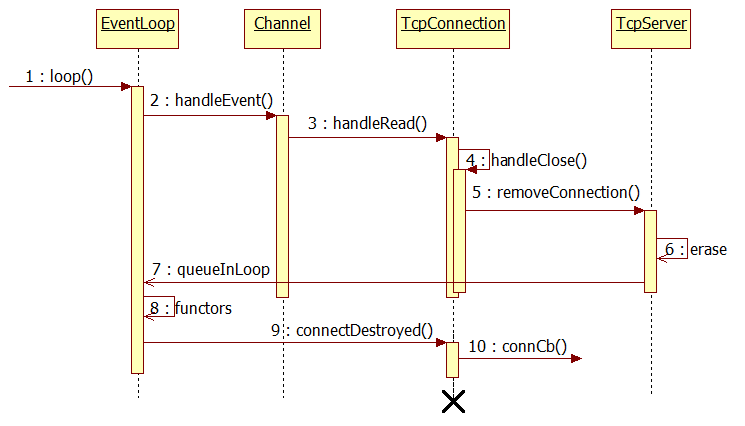muduo源码分析之TcpConnection
相关文件
muduo/net/TcpConnection.h
muduo/net/TcpConnection.cc
作用
TcpConnection是muduo中一个连接的抽象封装,表示"一次TCP连接"。
TcpConnection没有对外的用户接口,其对象由TcpServer创建。
在TcpServer中,当Acceptor接收新连接,TcpServer在回调函数中创建TcpConnection对象(参数是已经建好连接的socketfd)。
TcpConnection是muduo中最核心最复杂的类,主要包含一个Channel和一个Socket数据成员,即包含读事件、写事件、关闭连接等事件的回调函数。
TcpConnection源码分析
构造函数与连接建立
前面说到当Acceptor接收新连接,TcpServer在回调函数中创建TcpConnection对象(参数是已经建好连接的socketfd。将用户的连接回调函数connCb()注册到TcpConnection中,再通过TcpConnection::connnectEstablished()调用。

TcpServer创建TcpConnection设置回调函数:
//TcpServer.cc
void TcpServer::newConnection(int sockfd, const InetAddress& peerAddr)
{
loop_->assertInLoopThread();
EventLoop* ioLoop = threadPool_->getNextLoop();
char buf[64];
snprintf(buf, sizeof buf, "-%s#%d", ipPort_.c_str(), nextConnId_);
++nextConnId_;
string connName = name_ + buf;
LOG_INFO << "TcpServer::newConnection [" << name_
<< "] - new connection [" << connName
<< "] from " << peerAddr.toIpPort();
InetAddress localAddr(sockets::getLocalAddr(sockfd));
// FIXME poll with zero timeout to double confirm the new connection
// FIXME use make_shared if necessary
TcpConnectionPtr conn(new TcpConnection(ioLoop,
connName,
sockfd,
localAddr,
peerAddr));//引用计数为1,跳出newConnection函数后减一
connections_[connName] = conn;//引用计数为2
conn->setConnectionCallback(connectionCallback_);
conn->setMessageCallback(messageCallback_);
conn->setWriteCompleteCallback(writeCompleteCallback_);
conn->setCloseCallback(
std::bind(&TcpServer::removeConnection, this, _1)); // FIXME: unsafe
ioLoop->runInLoop(std::bind(&TcpConnection::connectEstablished, conn));//即上面设置的连接回调函数
}
TcpConnection构造函数
在构造函数中设置了自身Channel的回调函数
TcpConnection::TcpConnection(EventLoop* loop,
const string& nameArg,
int sockfd,
const InetAddress& localAddr,
const InetAddress& peerAddr)
: loop_(CHECK_NOTNULL(loop)),
name_(nameArg),
state_(kConnecting),
reading_(true),
socket_(new Socket(sockfd)),
channel_(new Channel(loop, sockfd)),
localAddr_(localAddr),
peerAddr_(peerAddr),
highWaterMark_(64*1024*1024)
{
channel_->setReadCallback(
std::bind(&TcpConnection::handleRead, this, _1));
channel_->setWriteCallback(
std::bind(&TcpConnection::handleWrite, this));
channel_->setCloseCallback(
std::bind(&TcpConnection::handleClose, this));
channel_->setErrorCallback(
std::bind(&TcpConnection::handleError, this));
LOG_DEBUG << "TcpConnection::ctor[" << name_ << "] at " << this
<< " fd=" << sockfd;
socket_->setKeepAlive(true);
}
调用用户的连接回调函数
void TcpConnection::connectEstablished()
{
loop_->assertInLoopThread();
assert(state_ == kConnecting);
setState(kConnected);
//shared_from_this()是临时对象,创建时引用计数加一,销毁时减一
channel_->tie(shared_from_this());//TcpConnection继承自enable_shared_from_this,返回这个对象的shared_ptr对象
channel_->enableReading();
connectionCallback_(shared_from_this());//用户回调函数
}
关闭连接
关闭连接时序图,其中的“X”表示TcpConnection通常在此析构

muduo中的关闭连接是被动关闭。即对方先关闭,本地read返回0,触发关闭逻辑。
为什么不能再TcpServer中直接erase()析构呢?
因为如果此时TcpConnection析构了,其中的通道Channel也就析构了,而EventLoop正在调用handleEvent(),会导致core dump。TcpConnection生命期应长于handleEvent()。
当连接到来,创建TcpConnection对象时,使用shared_ptr管理,引用计数为1;
在Channel中维护一个weak_ptr,将shared_ptr对象赋值给弱指针,引用计数仍为1;
当连接关闭,handleEvent函数中,将这个弱引用提升得到一个shared_ptr对象,引用计数变为2;
erase将指针移除,引用计数减一,TcpConnection对象不会被销毁。
调用完connCb()后,引用计数变为0;
//Channel.cc
void Channel::handleEvent(Timestamp receiveTime)
{
std::shared_ptr<void> guard;
if (tied_)
{
guard = tie_.lock(); //弱指针提升,引用计数加一
if (guard)
{
handleEventWithGuard(receiveTime);
//调用完,引用计数为2
//handleEvent返回后,局部对象guard销毁,又变回1
}
}
else
{
handleEventWithGuard(receiveTime);
}
}
void TcpConnection::handleRead(Timestamp receiveTime)
{
loop_->assertInLoopThread();
int savedErrno = 0;
ssize_t n = inputBuffer_.readFd(channel_->fd(), &savedErrno);
if (n > 0)
{
messageCallback_(shared_from_this(), &inputBuffer_, receiveTime);
}
else if (n == 0)//返回0,连接断开
{
handleClose(); //关闭连接
}
else
{
errno = savedErrno;
LOG_SYSERR << "TcpConnection::handleRead";
handleError();
}
}
void TcpConnection::handleClose()
{
loop_->assertInLoopThread();
LOG_TRACE << "fd = " << channel_->fd() << " state = " << stateToString();
assert(state_ == kConnected || state_ == kDisconnecting);
// we don't close fd, leave it to dtor, so we can find leaks easily.
setState(kDisconnected);
channel_->disableAll();
//如果是TcpConnectionPtr guardThis(this),相当于(new TcpConnection),得到的shared_ptr引用计数为1;
//必须是拷贝构造,引用次数才加一
TcpConnectionPtr guardThis(shared_from_this());//返回自身对象的shared_ptr,引用计数加一,为3
connectionCallback_(guardThis);//用户回调函数,可以不需要这一行
// must be the last line
closeCallback_(guardThis); //由TcpServer/Client 注册,通知其移除连接指针
}
TcpServer/Client移除指针
void TcpServer::removeConnection(const TcpConnectionPtr& conn)
{
// FIXME: unsafe
loop_->runInLoop(std::bind(&TcpServer::removeConnectionInLoop, this, conn));
}
void TcpServer::removeConnectionInLoop(const TcpConnectionPtr& conn)
{
loop_->assertInLoopThread();
LOG_INFO << "TcpServer::removeConnectionInLoop [" << name_
<< "] - connection " << conn->name();
size_t n = connections_.erase(conn->name());//移除,引用计数变2
(void)n;
assert(n == 1);
EventLoop* ioLoop = conn->getLoop();
ioLoop->queueInLoop(
std::bind(&TcpConnection::connectDestroyed, conn));//引用计数加一,为3
}
TcpConnection再收尾
connectDestroyed是TcpConnection析构前最后调用的一个成员函数,通知用户连接断开。
//该函数调用完后,引用计数减为0
void TcpConnection::connectDestroyed()
{
loop_->assertInLoopThread();
if (state_ == kConnected)
{
setState(kDisconnected);
channel_->disableAll();
connectionCallback_(shared_from_this());
}
channel_->remove();//通知Poller取消对该通道的监听
}



 浙公网安备 33010602011771号
浙公网安备 33010602011771号